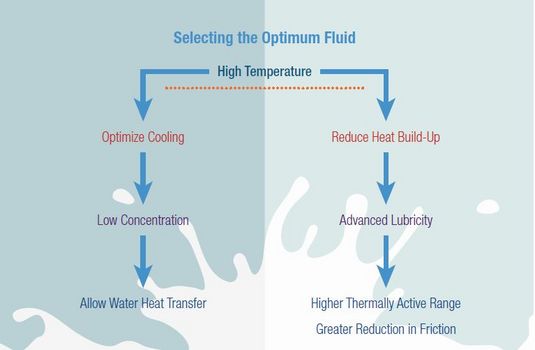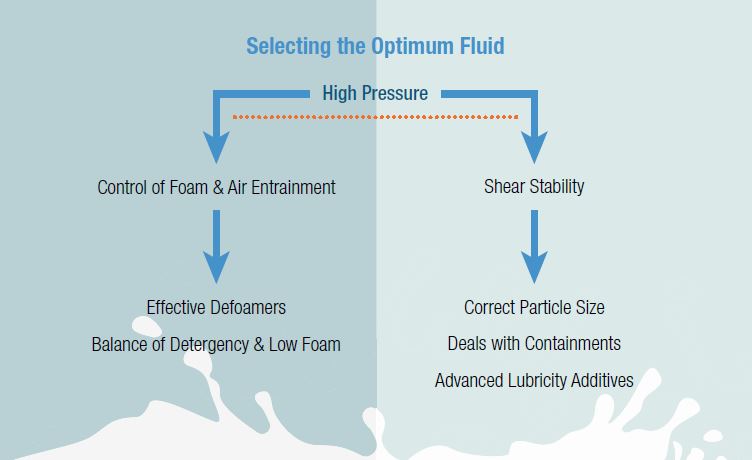ECOCOOL FOR AEROSPACE
There are many challenges on the horizon for aerospace manufacturers and their suppliers. The formulation, selection, and care of machining fluids play a vital role in meeting these challenges. The aerospace industry is faced with more advanced alloys, higher temperatures, greater pressures, and tighter tolerances than ever before. This requires balanced metalworking chemistries that adequately lubricate and cool without staining the workpiece or generating residues.
Reducing Temperatures

Advanced alloys often generate higher temperatures in the tool bite. The design of many new machining systems has decreased recovery time in smaller sumps. The combination of these factors requires the use of more innovative and robust fluids. Advanced lubricity additives, stable particle size, optimum wetting agents, air release additives, and the overall chemistry of these fluids helps minimize the generation and dissipation of heat from the tool-workpiece interface. Innovative formulations optimize tool life, part tolerances, quality, and the surface finish with challenging alloys and machining conditions.
Optimizing High Pressure Performance
High pressure coolant spray is essential for optimal cooling and chip evacuation, but can lead to foaming issues that can cause health and safety concerns, additive shearing, and premature tool wear. To achieve outstanding performance and alloy compatibility, enhanced defoamer chemistries are needed. An optimal blend of shear stable lubricity additives minimizes heat generation in the tooling, holder, and workpiece.

Many effective lubricity additives are widely used in automotive and general machining industries but are not acceptable in the aerospace industry. Experience, thorough knowledge, and access to alternative global additive chemistries is necessary to provide effective fluids to the aerospace industry.
Ensure Sustainability & Compliance
The need for new, safer chemistries means innovation, extensive research and development, new approvals, and a sustainable global supply chain. Sustainability, environmental considerations, global acceptability of chemicals, operator acceptability, and overall workplace conditions continue to increase in importance.
Controlling biological growth is an ongoing challenge throughout the metalworking industry and is growing more challenging with recent biocide shortages and increasing global chemical restrictions. Many common chemicals used to control biological growth are under increased scrutiny and regulations on a global basis. Secondary amines and registered biocides are currently the most common means of controlling biological growth in metalworking fluids but face current and pending global restrictions. Boron has also been historically used to address these issues but is now classified as a reproductive toxicity hazard.
Managing Cost
Overall fluid cost and performance awareness is necessary moving forward. The focus on per gallon costs must shift to a focus on the overall impact of fluids throughout the entire process. Criteria for fluid performance includes the influence on all cost centers including productivity, tooling, quality, scrap, filtration, waste treatment and disposal, and health and safety concerns.
ECOCOOL GLOBAL 1000 for Aerospace
ECOCOOL GLOBAL 1000 is an Aerospace industry grade water-miscible machining coolant unlike any metalworking fluid in the market today and contains a novel lubricity package that makes it especially effective on aluminum, titanium, Inconel, and stainless steel. This coolant also meets the Chemical Registry requirements of the top 19 industrialized economies and most major manufacturing companies’ restricted chemicals lists. ECOCOOL GLOBAL 1000 conforms to Boeing standards and recently received approval from Airbus in the latest version of the Airbus Process Specification: AIPS00-00-010 "List of authorized Cutting fluids for drilling and machining operations.
TECHNOLOGY THAT PAYS BACK
